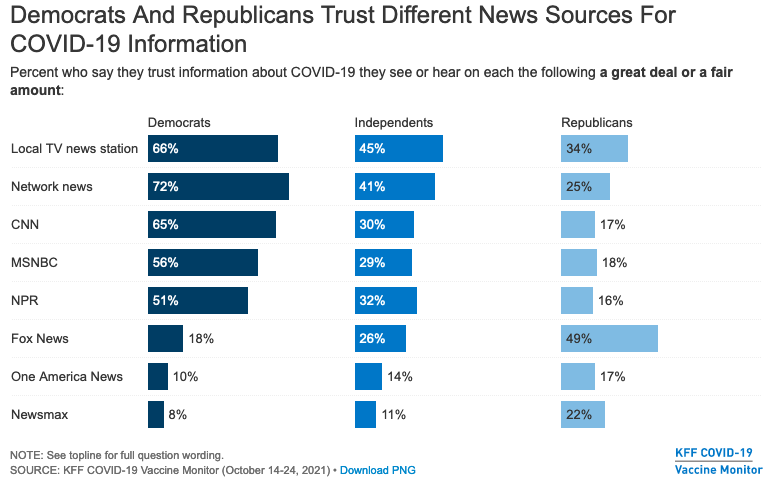New Findings From the Kaiser Family Foundation (KFF): “COVID-19 Misinformation is Ubiquitous: 78% of the Public Believes or is Unsure About At Least One False Statement, and Nearly a Third Believe At Least Four of Eight False Statements Tested”
From the Kaiser Family Foundation:
The KFF COVID-19 Vaccine Monitor is an ongoing research project tracking the public’s attitudes and experiences with COVID-19 vaccinations. Using a combination of surveys and qualitative research, this project tracks the dynamic nature of public opinion as vaccine development and distribution unfold, including vaccine confidence and acceptance, information needs, trusted messengers and messages, as well as the public’s experiences with vaccination.
Key Findings
- Misinformation about health care topics is nothing new, but social media, the polarization of news sources, and the pace of scientific development on COVID-19 have all contributed to an environment that makes it easier than ever for ambiguous information, misinterpretation, and deliberate disinformation to spread.1 We find in the latest Vaccine Monitor that belief in pandemic-related misinformation is widespread, with 78% of adults saying they have heard at least one of eight different false statements about COVID-19 and that they believe it to be true or are unsure if it is true or false. One-third (32%) of all adults believe or are uncertain about at least four false statements. Belief in COVID-19 misinformation is correlated with both vaccination status and partisanship, with unvaccinated adults and Republicans much more likely to believe or be unsure about false statements compared to vaccinated adults and Democrats.
- With the public’s trust in news media declining over many years, we find that no news media source garners the trust of a majority of the public when it comes to COVID-19 information. While nearly half trust information about COVID-19 that they see on network and local television news, trust is lower for other news outlets and diverges in expected ways along partisan lines. Unvaccinated adults are far less likely than vaccinated adults to trust most of the news sources included in the survey for information on COVID-19, with the exception of conservative news sources.
- People’s trusted news sources are correlated with their belief in COVID-19 misinformation. The share who hold at least four misconceptions is small (between 11-16%) among those who say they trust COVID-19 information from network news, local TV news, CNN, MSNBC, and NPR. This share rises to nearly four in ten among those who trust COVID-19 information from One America News (37%) and Fox News (36%), and to nearly half (46%) among those who trust information from Newsmax. One thing this study cannot disentangle is whether this is because people are exposed to misinformation from those news sources, or whether the types of people who choose those news sources are the same ones who are pre-disposed to believe certain types of misinformation for other reasons.
- These findings suggest a challenge for reaching people with accurate information about COVID-19. While that challenge is particularly acute when it comes to reaching those who remain unvaccinated, the partisan divisions in misinformation and trusted news sources also have implications for those who are vaccinated, as we have reported a growing partisan divide in intention to get COVID-19 booster shots, even among the fully vaccinated.
Learn More Read the Complete Report (approx. 1780 words)
Filed under: News
About Gary Price
Gary Price (gprice@gmail.com) is a librarian, writer, consultant, and frequent conference speaker based in the Washington D.C. metro area. He earned his MLIS degree from Wayne State University in Detroit. Price has won several awards including the SLA Innovations in Technology Award and Alumnus of the Year from the Wayne St. University Library and Information Science Program. From 2006-2009 he was Director of Online Information Services at Ask.com.



